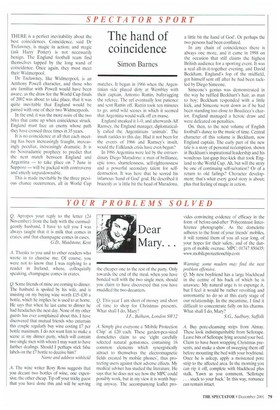The hand of coincidence
Simon Barnes
THERE is a perfect inevitability about the best coincidences. Coincidence, said Dr Trelawney, is magic in action: and magic (ask Harry Potter) is not necessarily benign. The England football team find themselves tapped by the long wand of coincidence. Once again, they must meet their Widmerpool.
Dr Trelavvney, like Widmerpool, is an Anthony Powell character, and those who are familiar with Powell would have been aware, as the draw for the World Cup finals of 2002 was about to take place, that it was quite inevitable that England would be paired with one of their two Widmerpools.
In the end, it was the more noire of the two betes that came up when coincidence struck. England must face an enemy whose path they have crossed three times in 35 years.
It is no coincidence at all that each meeting has been increasingly fraught, increasingly peculiar, increasingly dramatic. It is no Nostradamic prophecy to predict that the next match between England and Argentina — to take place on 7 June in Sapporo — will be packed with controversy and utterly unputdownable.
This is made inevitable by the three previous chance occurrences, all in World Cup matches. It began in 1966 when the Argentinian side played dirty at Wembley with their captain, Antonio Rattin, bullyragging the referee. The ref eventually lost patience and sent Rattin off. Rattin took ten minutes to go, amid wild scenes in which it seemed that Argentina would walk off en masse.
England sneaked it 1-0, and afterwards Alf Ramsey, the England manager, diplomatically called the Argentinians `animals'. The insult ranldes to this day. Had it not been for the events of 1966 and Ramsey's insult, would the Falklands crisis have even begun?
In 1986 Argentina were led by the extraordinary Diego Maradona: a man of brilliance, epic rows, shamelessness, self-righteousness and a powerful secondary talent for selfdestruction. It was here that he scored his infamous 'hand of God' goal. He described it brazenly as `a little bit the head of Maradona, a little bit the hand of God'. Or perhaps the two persons had been conflated.
In any chain of coincidences there is always one more, and it came in 1998 on the occasion that still claims the highest British audience for a sporting event. It was a real all-in-it-together evening, and David Beckham, England's fop of the midfield, got himself sent off after he had been tackled by Diego Simeone.
Simeone's genius was demonstrated in the way he ruffled Beckham's hair, as man to boy; Beckham responded with a little kick, and Simeone went down as if he had been standing too close to Boadicea's chariot. England managed a heroic draw and were defeated on penalties.
On. then, to the next volume of English football's dance to the music of time. Central character of this volume is Beckham, now England captain. The early part of the new tale is a story of personal redemption, shown in Beckham's inspirational leadership and his wondrous last-gasp free-kick that took England to the World Cup. Ah, but will the story be one of continuing self-salvation? Or of a return to old failings? Character development: that's what every good story is about; plus that feeling of magic in action.






















































































 Previous page
Previous page